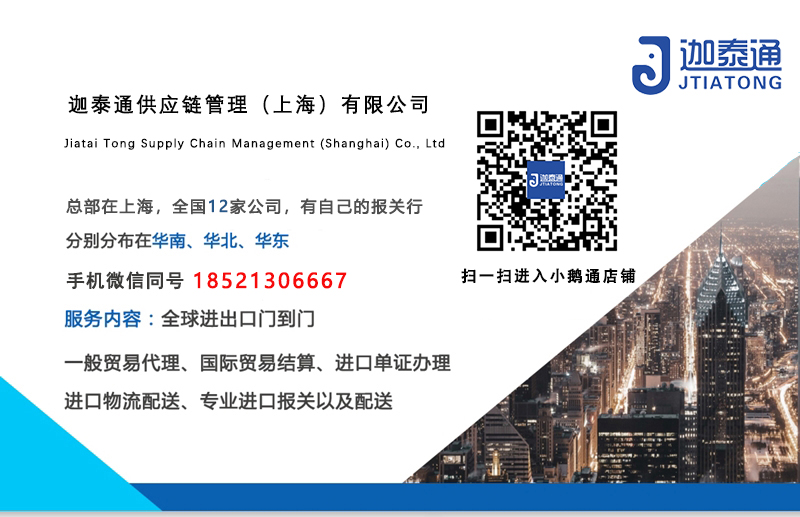Customs Knowledge: New Regulations on the Import of Special
New regulations for the import of special dietary food
1、 What is a special dietary food?
According to the "Food Safety Standards for Pre packaged Special Dietary Food Labels" (GB 13432-2013), special dietary foods refer to foods specially processed or formulated to meet special physical or physiological conditions and/or special dietary needs under diseases, disorders, and other conditions. The content of nutrients and/or other nutrients in this type of food is significantly different from that of comparable regular foods.
2、 What specific foods do special dietary foods include?
According to Appendix A of GB13432-2013, the categories of special dietary foods include:
A Infant formula food
- Infant formula
- Formula for older infants
- Preschool formula food
- Infant formula for special medical purposes
B Supplementary foods for infants and young children
- Cereal supplements for infants and young children
- Canned supplementary foods for infants and young children
C Special Medical Purpose Formula Food
Other special dietary foods other than the above categories
Including complementary nutrition supplements, sports nutrition foods, and other special dietary foods with corresponding food safety standards (such as nutritional supplements for pregnant women and lactating mothers)

3、 New Requirements for Food Safety Supervision of Overseas Production Enterprises of Imported Special Dietary Food by Customs
According to Article 18 of Order 249, the General Administration of Customs implements registration management for overseas production enterprises exporting food to China and publishes a list of registered enterprises. According to Article 7 of the "Regulations on the Registration and Administration of Overseas Production Enterprises of Imported Food of the People's Republic of China" (Order No. 248 of the General Administration of Customs), overseas production enterprises of the following foods shall be recommended for registration by the competent authorities of the country (region) where they are located to the General Administration of Customs: meat and meat products, casings, aquatic products, dairy products, bird's nest and bird's nest products, bee products, egg and egg products, edible fats and oils, stuffed pasta, edible grains Grain milling industrial products and malt, fresh and dehydrated vegetables, as well as dried beans, seasonings, nuts and seeds, dried fruits, unbaked coffee beans and cocoa beans, special dietary foods, and health foods.
The competent authorities of the country (region) where the enterprise is located shall conduct an audit and inspection of the recommended registration, confirm that it meets the registration requirements, and then recommend registration to the General Administration of Customs and submit the following application materials:
(1) Letter of recommendation from the competent authority of the country (region) where it is located;
(2) List of enterprises and application for enterprise registration;
(3) Enterprise identification documents, such as business licenses issued by the competent authorities of the country (region) where the enterprise is located;
(4) A statement from the competent authority of the country (region) where the enterprise meets the requirements of this regulation;
(5) The review report of the competent authority of the country (region) where the relevant enterprise is located for audit and inspection.
When necessary, the General Administration of Customs may request the provision of enterprise food safety, hygiene, and protection system documents, such as floor plans of enterprise factories, workshops, and cold storage, as well as process flow diagrams.
That is to say, overseas production enterprises importing special dietary food must be recommended for registration by the competent authorities of their respective countries (regions) to the General Administration of Customs.
4、 New regulations on Chinese labeling of imported special dietary foods
According to Article 30 of Order 249, the packaging, labeling, and labeling of imported food shall comply with Chinese laws, regulations, and national food safety standards; If there should be a manual in accordance with the law, there should also be a Chinese manual. The Chinese labels of imported health food and special dietary food must be printed on the minimum sales packaging and cannot be added.
Chinese labels for imported health food and special food that meet the requirements of Chinese laws, regulations, and national food safety standards must be directly printed on the minimum sales packaging before entry, and cannot be added within the country.
The Chinese labels of imported special dietary food should comply with the relevant requirements of GB 13432-2013. When a registered enterprise exports special dietary food to China, it shall mark the registration number in China or the registration number approved by the competent authority of the country (region) where it is located on the inner and outer packaging of the food.

5、 New Customs Requirements for Importers of Special Dietary Foods
According to Article 22 of Order 249, food importers shall establish an audit system for overseas exporters and overseas production enterprises, with a focus on reviewing the following contents:
(1) The development and implementation of food safety risk control measures;
(2) Ensure that food complies with Chinese laws and regulations and national food safety standards.
That is to say, importers of special dietary food should review the implementation of food safety risk control measures by overseas enterprises before importing products, as well as whether the products meet the requirements of Chinese laws and regulations and national food safety standards, to ensure that special dietary food entering China meets the relevant requirements of Chinese laws and regulations.
At the same time, Article 21 of Order 249 stipulates that food importers shall establish a food import and sales record system, truthfully record the food name, net content/specifications, quantity, production date, production or import batch number, shelf life, name, address and contact information of overseas exporters and buyers, delivery date, and other contents, and keep relevant vouchers. The retention period of records and vouchers shall not be less than 6 months after the expiration of food shelf life; If there is no clear shelf life, the shelf life is at least 2 years after sales.
Starting from January 1, 2022, importers of special dietary food should keep import and sales records of relevant products, and relevant vouchers should not be less than 6 months after the food shelf life. That is to say, if the product shelf life is two years, relevant records and vouchers should be kept for at least two years and 6 months.
6、 Other special import regulations for imported special meals and edible foods
According to the Announcement on Strengthening the Management of Imported Infant Formula Milk Powder issued by the former General Administration of Quality Supervision, Inspection and Quarantine (Announcement No. 133 of 2013), if the inspection date for imported infant formula milk powder is less than 3 months until the expiration date of the shelf life, it shall not be declared for import; Imported infant formula milk powder must have been filled in the minimum retail packaging sold to consumers, and imported large packaging infant formula milk powder will not be declared for import. The Chinese label of imported infant formula milk powder must be directly printed on the minimum sales packaging before entry, and cannot be added within the country. If there are no Chinese labels on the product packaging or if the Chinese labels do not comply with Chinese laws and regulations and national food safety standards, they will be returned or destroyed as unqualified products.
According to the relevant provisions of the Food Safety Law and its implementation regulations, the product formula of infant formula milk powder should be registered with the Food and Drug Administration of the State Council, and the formula food for special medical purposes should be registered with the Food and Drug Administration of the State Council. When importing infant formula milk powder and special medical purpose formula food, relevant registration certificates from the State Council's food and drug regulatory department should be submitted. At the same time, the Chinese labels and instructions for imported infant formula milk powder and special medical purpose formula food should be consistent with the registered labels and instructions.
本文来源:http://www.jtia56.cn/list_68/378.html
本文标题:Customs Knowledge: New Regulations on the Import of Special
注:本文部分图文来源于网络,如有侵权联系我们删除,谢谢!
Customs Knowledge: Inspection and Quarantine of Frozen Fruit 【 Customs Knowledge 】 Quarantine Requirements for Fresh P
迦泰通(海关AEO高级认证企业)-服务范围
迦泰通19年进出口通关经验,10+分公司,支持全国进口申报;是海关AEO高级认证企业,专注全球门到门,一站式进口代理清关服务!我司业务范围:国际运输、进口报关清关、仓储配送、代签外贸合同与付汇、暂时进出口等。全国免费咨询电话tel:18521306667
【相关推荐】
- 了解详情 > How much do you know about sports nutrition food?
- 了解详情 > Customs knowledge: Chinese medicinal materials that are haza
- 了解详情 > Customs Knowledge: New Regulations on the Import of Special
- 了解详情 > [Customs Knowledge] How much do you know about infant formul
- 了解详情 > 【 Customs Knowledge 】 Import of baking raw materials such
- 了解详情 > 【 Customs Knowledge 】 Inspection and Quarantine Requireme






